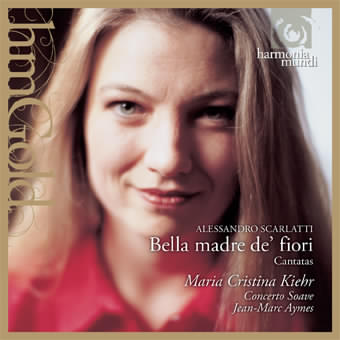Texte paru dans: / Appeared in:
|
|
|
Reviewer: Lindsay
Kemp Early Scarlatti cantatas distinctively sung
Though I can hardly claim extensive knowledge of Alessandro Scarlatti's vocal output - how could I when his chamber cantatas alone number more than 600? - it does seem to me that there were two sides to this composer. One was the 17th-century man whose varied forms, short arias and expressive ariosos show his cantatas to be heir to the tradition of Carissimi and Stradella; the other was the 18thcentury version, whose longer arias slot into the more regular recitative-aria alternation familiar from a Handel or a Vivaldi. This disc presents three works by the earlier of these two Scarlattis, all composed in the 1680s or '90s.
Bella madre de' fiori and Correa nel seno amato both portray Arcardian characters calling on nature to echo their laments for absent lovers, while Poi che riseppe Orfeo shows our old friend bemoaning his fate senza Euridice, before resolving to journey to the underworld to retrieve her. Throughout these works Scarlatti displays tireless imagination and no little originality. Nothing is entirely predictable (some recitatives are longer than arias, and a cantata is as likely to end with one as with the other), melodic lines show a moving sadness, and there is music of considerable emotional power, perhaps none more than Orfeo's extraordinary aria 'Crude stelle', with its mixture of aching melodic leaps and chromatic pangs . Maria Cristina Kiehr has a distinctive voice, of the sort that may be an acquired taste. She uses little vibrato, allowing her to give her lines clean and accurate definition, even though the resulting sound can be unrelenting, perhaps even a touch hooty. Both sound and style - basically rather straight but with occasional little swoops and note-bendings - call to mind her teacher Rene Jacobs, and while her darkish tonal colouring can obscure some of the words, it is good for evoking the mood of these particular pieces - general dolefulness rather than outspoken drama. She receives adequuate support from Concerto Soave (the harp is a nice addition to Bella madre, though by the same token an odd omission from Orfeo), but I found the instruments too close in the balance; I could have done without discovering that the harpsichord has a squeaky key. |
|
|
|
|
|
Cliquez l'un ou l'autre
bouton pour découvrir bien d'autres critiques de CD |
|




